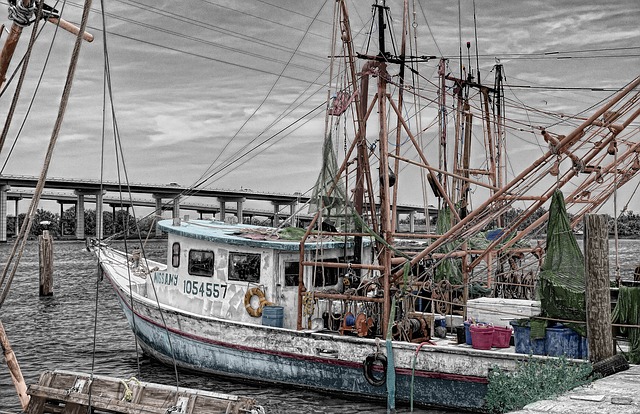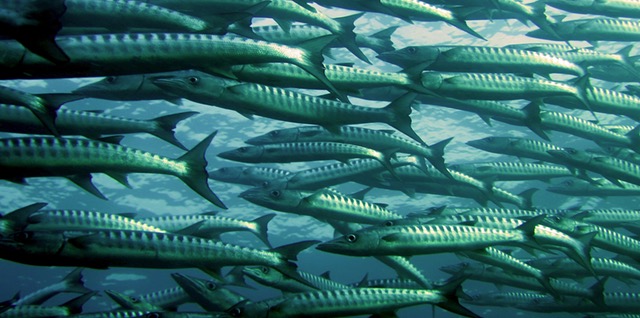The Low-Down on Buying Fresh Fish in Israel

Fish (דָג – dag, pl. דָגִים – dagim) are known to be a good source of high quality protein and an excellent source of health promoting omega 3 fatty acids (which most of us don’t get enough of) as well as vitamins A and D, phosphorus, magnesium, selenium, and iodine in marine fish.
Omega 3 fatty acids are especially important for brain health, and are particularly important for the normal brain development in unborn babies and infants.
Today, due to contaminated ocean waters, and mercury and PCBs found in some ocean fish, as well as the health issues associated with farmed fish (especially for those of us coming from the US where fish farming, in open cages in the sea, has a particularly bad reputation), there is concern about the quality of the fish we eat, leaving us wondering which fish (if any) is healthy.
Fish farmed in open cages along coastlines contain great numbers of fish in a small area without much room to move around, unnatural feed, and because of their closed quarters, are susceptible to many different viruses. As such they are generally given large doses of antibiotics. In addition, their waste tends to remain on the bottom of the ocean floor, polluting the waters below the cages and destroying the sea life. Salmon, in particular, fair poorly in these conditions and farmed salmon that escape spread their diseases to the wild fish, having a devastating affecting on the entire wild population.
Realizing that much of the fish in Israel is farmed and unsure about the growing conditions of much of the fresh fish sold in fish stores and supermarkets, I reached out to Tomer Borovski, M.Sc, an aquaculture (fish farming) instructor with the Ministry of Agriculture & Rural Development, Agricultural Extension Service of Israel, to learn about the fish sold in Israel and Israeli aquaculture. Tomer was raised on Kibbutz Ma’agan Michael (Michael’s Port) where fishing is the main industry. At the peak fishing period, the kibbutz had 4 trawlers. The kibbutz raises a variety of fish, much of which are exported worldwide.
The Eastern Mediterranean used to be an important source of wild caught fish in Israel; this is no longer the situation because of the negative effects that the building of the Aswan Dam and Suez Canal have had on the conditions of the sea and on animal populations.
Today, most fish raised and sold in Israel are farmed; 20,000 dunams (5,000 acres) of land are dedicated to aquaculture. Israeli aquaculture is based on a system of inland fish ponds, except for some seabream which are raised in underwater cages in the Ashdod Port[1]. Eighty percent of the ponds are located in the Bet Shean Valley. Trout are raised close to Israel’s northernmost border. The ponds are located near and feed into rivers or streams. Between 18,000 – 20,000 tons of fish are produced each year.

Aquaculture, Tomer explained, is much more complex than raising farm animals and poultry. Despite the different types and breeds of birds, cows, sheep, and goats, their food and environment requirements are basically the same. Not so for fish. Each different type of fish has different water, feed, growing, and even social requirements. And while cows, sheep, goats, and birds breathe the air around them, fish farmers have to provide for the entire environment the fish live in. Successful aquaculture depends upon paying close attention to the needs of each different species and providing them with their exact requirements.
Except for mullet, which are not given any special feed and eat whatever is in the water, the fish are given special feed based on their specific needs and stages in life as well as feeding on whatever else is in the water.
Careful attention is paid to the water quality, making sure that the water is kept clean, at the right temperature, properly oxygenated, etc. Testing the water quality is the primary method by which farmers can ascertain the health of the fish since they can’t see them under the water.
While antibiotics may be used for fish in densely populated, super intensive farming ponds, these fish are used for research, not for consumption. Fish raised for consumption are in low density ponds and are seldom given antibiotics. The preferred method is to allow the fishes’ immune systems to take care of any illnesses as much as possible. The industry is highly regulated and fish health is checked regularly.
In order to know where the fresh fish in your supermarket comes from and how fresh they are, Tomer advises asking the shopkeeper to see the crate they were delivered in. Check the date and country of origin listed on the crate. You want to see today or yesterday’s date. In general, aside from purchasing Israeli fish, one can feel comfortable purchasing fish produced in Greece, Cyprus, or Turkey because their main market is Europe, where standards are quite strict. Fish produced in China should not be purchased as their standards are either unknown or below par.

It is best to find a fish monger you can trust and buy fresh fish for immediate use. If you are not planning on cooking it within a day or two either don’t buy it or freeze it.
To check for freshness when buying whole fish you should check the color of the gills which should be a deep red; the closer to white, the less fresh it is. Fresh fish should have a shiny and firm body and should not dent if you press your finger into it. In addition, the eyes should not be cloudy or sunken. And most surprisingly, it shouldn’t smell like a fish; fresh fish don’t smell.
Besides providing home grown fish, the Israeli market also has a variety of imported fish. [2] Some fresh (not frozen) fish available in Israeli fish markets and supermarkets include:
- Sea Bream, דניס – Denise; origins: Israel, Cyprus, Greece, or Turkey
- Sea Bass (desentrus labrocsis), לַבְרָ – labrak; origins – Israel, Cyprus, Greece, or Turkey
- Salmon, סַלמוֹן – salmon (the “L” is not silent); origins: Norway and Scotland
There is no Israeli salmon. - Trout, פוֹרֶל – forel; origins – Northern Israel and Turkey
- Carp, קַרפִּיוֹן – karpion; origins: Israel (frozen from US)
Carp are currently the only fish that are vaccinated; they are part of the Koi family, and susceptible to the Koi Herpes Virus. - Mullet, בורי – boori; origins: Israel
Mullet is a particularly popular fish in Israel - Tilapia, אַמְנוּן – amnoon; origins: Israel
Tilapia are given hormones for two weeks in order to change the sex of the fish to male, although the tilapia in the ponds are never 100% male. Otherwise, there are problems with the water quality and oxygen levels in reservoirs when they start spawning. - Hybrid Striped Bass (rock bass): הסלע בַּס – Bass Ha’selah; origins: Israel
- Barramundi, ברמונדי – Baramundi; origins: an Australian fish grown in Israel
- Red Drum, מוסר – moosar; origins: Israel
- Tuna, טונה – Tuna; there is no Israeli Tuna
Frozen fish always has the country of origin on the package. But, Tomer says, with the great variety of high quality fresh fish here, there is really no reason to buy frozen fish in Israel.
Notes:
[1] This article on the Green Prophet website about raising sea bream in open cages in Israel confirms the problems associated with this type of fish farming.
[2] Go here, here, here, and here for more information of the quality of salmon and other fish from abroad, including which are the best and worst choices.
